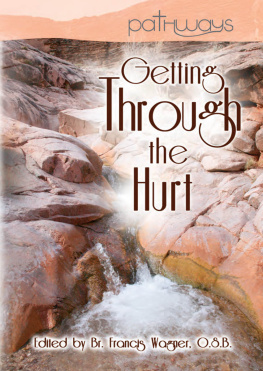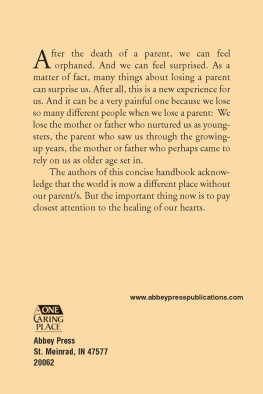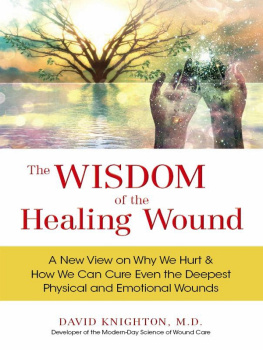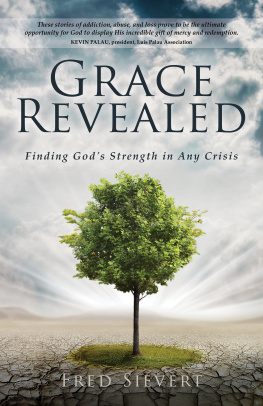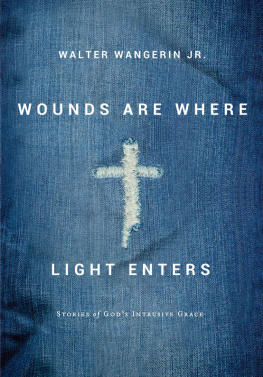Getting Through the Hurt
Edited by Br. Francis Wagner, OSB

Abbey Press Publications
Introduction
We all know and strive to accept the fact that life presents each one of us with our share of difficulties from day to day. Unfortunately, however, sometimes there also are particularly painful or unsettling circumstances which seem to get the best of us. Addiction, divorce, grief, and the anger that arises from feeling unloved and unwanted: these wounds, and so many others, cut very deep. They leave scars which may never entirely heal, and must be struggled with over the course of a lifetime.
The good newsfrom the Christian perspectiveis that we are never alone during such trials. In the cross, God comes to meet us in the person of Jesus. He takes on our suffering, provides it with meaning, and leads us through it to the promise of resurrection. When Jesus rose from the tomb, his wounds were still presentbut they had been transformed in a manner that strengthens our faith. Take courage; I have conquered the world! he tells us (John 16:33).
With Jesus, we also will prevailand often through those very difficulties which seem to overwhelm us at times. Getting through the hurt in our lives asks us to claim our wounds, unite them with Jesus, and allow Gods grace to pour in and transform them into the means of discovering new life.
Ultimately, God asks us to trust that his goodness will secure victory over all distress, division, and death. This is the theme presented by the five chapters of this bookoriginally published by Abbey Press Publications as individual titles in the CareNotes Catholic Perspectives series. In them, we are reminded that having faith does not mean that we will not have troubles, even particularly painful ones at times. However, faith does provide us with the assurance we sometimes need, the endurance to continue our journey, and the wisdom to see and experience Gods saving grace in even the darkest valley (cf. Psalm 23:4). May this little book help guide you along the way.
Br. Francis Wagner, O.S.B.
Chapter I
When You Are Feeling Overwhelmed by Lifes Trials
By Fr. Keith McClellan
I was a six-year-old and in the first grade. I sat at the small, lift-top desk with its pencil groove and outmoded inkwell hole, trying to complete the addition and subtraction problems in my arithmetic workbook. Gradually, an intense sadness came over me. Then tears filled my eyes, falling once or twice on the page below. Despite my effort to hold them in, one or two of my classmates noticed me and went immediately to get the teacher.
Sister Alypia came immediately. She asked me what the matter was. I couldnt really say. She leaned down close to me so that her nuns veil seemed a warm, protective tent around me. She whispered, Youre doing good work. Its OK. That reassurance was all I needed.
In retrospect, the tears might have been caused by guilt because I had been skipping problems that were too difficult. Perhaps the tears expressed homesickness or a passing melancholy.
Adults do not always appreciate the weight of burdens that affect children. For us, troubles and trials have only a capital T. The root of the word overwhelm means to turn upside down, to capsize, to submerge. Anyone, at any age, at any time may feel overwhelmed. The size or seriousness of the trouble is not always the trigger for the crushing emotional effect. Each person has a different threshold for becoming overwhelmed.
Let nothing trouble you, let nothing scare you;
All is fleeting; God alone is unchanging.
Patience, everything attains.
Who possesses God, nothing wants.
God alone suffices.
St. Teresa of Avila
Trials are a fact of life from the moment we leave our mothers womb and enter the unknown of the world outside. From then on, while we begin to encounter the beauty of creation and the marvels of living, we soon learn that the path ahead is not straight and unimpeded. We face obstacles, competing interests, physical limitations, environmental conditions, inconstant relationships, and the fickleness of human affairs. All these and more spell trials.
I hope to offer a bit of wisdom and spiritual insight for coping with the overwhelming feelings that can accompany lifes trials. A meaningful life cannot be trouble-free. As the Lord Jesus experienced and taught, In the world you face persecution. But take courage; I have conquered the world! (John 16:33).
Working your way through
By tradition, a tiny sacristy to the side of the Vaticans Sistine Chapel is called the room of tears. A newly elected pope goes there to sign his name, clothe himself in the white cassock, and to pray. Clearly, the room gets its name on the assumption that the weight of such high office might induce tears in a humble man.
I have known married couples, families, and individuals who experience more than their share of pain and suffering. Serious illnesses plague their loved ones. Marriages disintegrate. Unemployment or financial issues intrude. Children reject their parents. Deaths come tragically and often close together. Despite their virtue and kindness, good people have bad things happen to them. However, nothing can take our peace away unless we seek answers outside the constants of faith, hope, and love.
Unpack the burden . Often, we tend to look too far down the road. We bundle our troubles and potential troubles together, and then wonder why they are so heavy. However, reason suggests that we look at them singly and objectively, putting them in context and addressing what is most urgent. More important, we must look at them in the light of Gods will for us. As Blessed Mother Teresa of Calcutta counseled, Yesterday is gone. Tomorrow has not yet come. We have only today. Let us begin.
The traditional Byzantine icon of the Nativity of Christ portrays Saint Joseph, pensive and doubtful, off in a corner, facing the devil, who is disguised as an old man. What other saint had such an overwhelming burdena mysteriously pregnant wife, the weight of Jewish law regarding adultery, taxes to pay, a seeming outsider to Gods plan and tempted to doubt? Despite his complex dilemma, Joseph remained silent, serene, faithfuland dutiful. He took one step at a time.
So do not worry about tomorrow
for tomorrow will bring worries of its own.
Todays trouble is enough for today.
Matthew 6:34
Let go of your ego . According to Gerald G. May, M.D., many human and spiritual anxieties are caused by our ego-self. We tend to act willfully instead of willingly. The troubles we face evoke a strong sense of personal responsibility and fear of coming up short in the judgment of others. So we act as though it all depends on me. Religion calls this pride. It is like the Chinese finger trap we used to see at birthday parties. If the children try to pull their finger out of the ends, they are firmly caught. However, if they cease to pull, the weave relaxes and the finger is freed.
Whether it is troubles, relationships, addictions, or ones prayer life, willfulness enlarges the ego and sets us up for anxiety and failure. Acceptance opens us to new possibilities.
Look for meaning . Our personal worries shrink in comparison to the troubles of those who have lived at the extremes. In his classic personal account of survival in the Auschwitz concentration camp, Viktor Frankl determined that the state of a prisoners inner self, in the face of horrendous external circumstances, was a free decision. Those who allowed themselves to dwell on what was lost, to indulge their pains and privations, or to conclude there was nothing more to expect from life, would weaken more readily.

